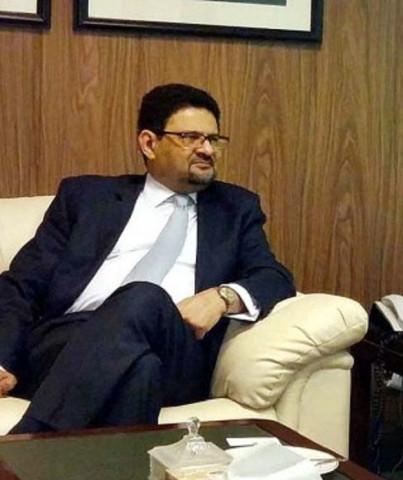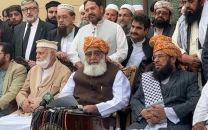Being placed on FATF grey list not to harm economy: Ismail
PM’s adviser tells NA the country will stay on the list for 6 to 12 months

Dr Miftah Ismail. PHOTO: APP
“There is absolutely no chance of Pakistan being placed on the FATF blacklist. However, getting on the greylist will affect the reputation of the country besides affecting banking transactions,” Ismail said on Thursday while responding to queries of opposition lawmakers in the National Assembly.
The adviser, who is regarded as the de facto finance minister, said Pakistan is not on any sort of FATF list right now and will be put on the grey list of it in June this year. “The country will remain on this list for the next six to 12 months,” he added.
US trying to 'embarrass' Pakistan with terror financing list: minister
Terming it as a move to embarrass Pakistan, the adviser said the country was placed on the greylist on the insistence of the US and India. “They wanted to embarrass Pakistan rather than curbing money laundering and countering terror financing. In reality, stringent anti-money laundering laws are in place in Pakistan,” he added.
He said Pakistan was also put on the greylist of the international body in 2008, but restrictions were not imposed on in the same manner as they were on North Korea and Iran.
“Pakistan was taken off the grey list in 2010. It also remained on the greylist from 2012 to 2015 as well. During this period Pakistan launched bonds in the international market besides getting loans from the World Bank and Asian Development Bank,” he added.
Financial Action Task Force correctly faults Pakistan
Ismail said it was required of Pakistan to send some report to the Asia Pacific Group. These reports were submitted in 2016 and 2017. He said it was Canada which analysed these reports last time.
“On January 20, the US moved a nomination proposal against Pakistan with the support of Britain which a week later was also supported by France and Germany. The nomination proposal was required to be sent to Pakistan as a formal procedure but this was not done. This was against the standard practice and the FATF decided to take up the matter against Pakistan directly,” he added.
Ismail said Pakistan conveyed its reservations to the FATF and made attempts to counter the move through diplomatic means.
He said on February 12, Pakistan submitted its another report to the Asia Pacific Group in which measures – like bringing an amendment in the anti-terrorism act – were stated which Pakistan has taken to take action against the organisations which are on the blacklist of UNSC.
Pakistan to go on FATF terror financing list in June
“I had proposed to the FATF to submit a detailed compliance report by May this year and not to put Pakistan on the grey list, but they ignored his proposal under US and Indian influence,” he added.
Dr Shireen Mazari asked why Pakistan was placed on the greylist if all formalities had been fulfilled. “Why Saudi Arabia and China did not extend support to Pakistan?” She also expressed reservations on the grant of visa-on-arrival to citizens of countries which did not support Pakistan on the matter.
Naveed Qamar said the country’s neighbours have turned against it and those countries which had supported Pakistan in the first round did otherwise in the second round.
“We are not ready to abandon [the practice] of discriminating between good terrorists and bad terrorists. Placing of Pakistan on the grey list is a failure of the country’s foreign policy,” he added.
He asked how remittances would come to Pakistan when it is on the greylist and laid stress on sorting out all the things with the body. Earlier Minister for Parliamentary Affairs Sheikh Aftab Ahmed said the government had put the country on the path of progress and prosperity.
Winding up discussion on President Mamnoon Hussain’s June 2017 address to the joint sitting of the Parliament, he said the government successfully eliminated terrorism from the country, restored law and order in Karachi, started China-Pakistan Economic Corridor, and initiated mega power projects.
“Now Pakistan has become an attractive destination for foreign investments,” he added. Later, the house passed a motion of thanks paying deep gratitude to the president of Pakistan.
PPP lawmakers also staged a walkout from the house over the water shortage in Sindh, which, they claim, is not getting its due share of water under a 1991 accord.
To register protest for not being allowed to monitor the Senate election from the press gallery on March 3, members of the media boycotted the proceedings of the house for some time.
On the directives of Speaker Ayaz Sadiq, Deputy Speaker Murtaza Javed Abbasi assured the media persons that he would take up the matter with the Election Commission of Pakistan (ECP).



















COMMENTS
Comments are moderated and generally will be posted if they are on-topic and not abusive.
For more information, please see our Comments FAQ